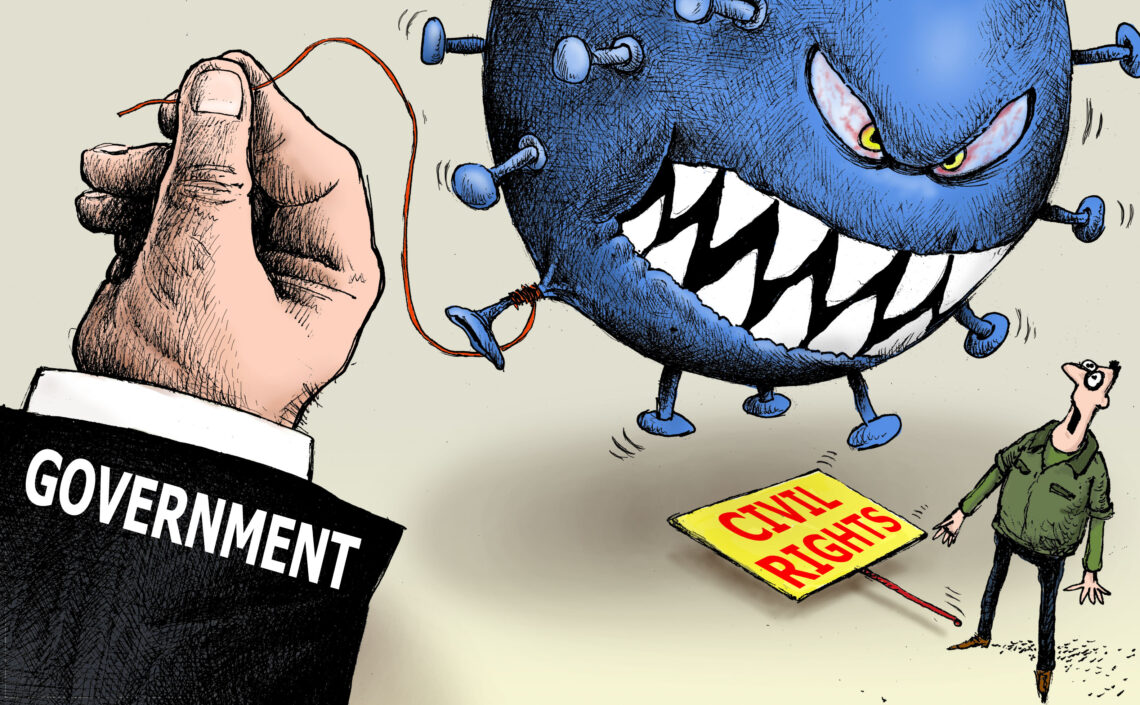The loss of constitutional protection
During the Covid-19 crisis, European governments are enacting more and more open-ended measures that severely restrict personal freedom, privacy and entrepreneurship. Alarmingly, citizens’ rights enshrined in constitutions are being set aside.

As the Covid-19 pandemic spread across the globe, harsh measures were gradually introduced. Governments have begun to limit individual rights and privacy. The media and politicians, as well as some virologists and medical professionals, have stirred up panic. Those who question the necessity of taking drastic steps are intolerantly marginalized and branded as either idiots or radicals.
The success of Western democracies is based on the guarantee of freedom and human rights. The United States Declaration of Independence and constitution provide citizens with unalienable rights that include liberty and the pursuit of happiness (which is not guaranteed, as it is defined individually), as well as privacy and property rights. The constitution’s objective was to protect the individual from the state. Tolerance and freedom of opinion were also protected.
Stealing freedoms
Property rights have since become restricted because of ever-expanding regulations and excessive taxation. The high tax burden is not solely a result of the governments’ tendency to overspend. Leftist ideologies and populist slogans demanding “more equality” also play a role in raising taxes.
Many of the present guidelines appear unjustified. And there has been no reliance on individual responsibility.
Waves of regulations are steadily narrowing the boundaries of individual activity and increasing the state’s power over citizens. Unfortunately, this is a global phenomenon.
In 1998, the so-called great eavesdropping law (grosse Lauschangriff) was passed in Germany. It allowed security agencies to plant surveillance devices in suspects’ homes without approval from a judge. The measure was highly contested at the time. In 2014, the European Parliament enacted a directive requiring telecommunication and internet providers to retain all communication data for two years and make it available to law enforcement agencies upon request. Every EU citizen is now treated as a suspect. The Court of Justice of the European Union considered the directive to be “a wide-ranging and particularly serious interference with the fundamental rights to the respect for private life and to the protection of personal data, without that interference being limited to what is strictly necessary.” The EU Parliament was supposed to amend the directive but has failed to do so, and it remains in force.
In many cases, the measures enacted to contain Covid-19 encroach upon personal rights. Such extraordinary circumstances can require restrictions, but they should have a clear expiry date. Many of the present guidelines appear unjustified. And there has been no reliance on individual responsibility. The governments’ approach toward citizens has been shockingly paternalistic; they treat the population like misbehaving children.
This month, Germany passed the Infection Protection Act – a law “for the protection of the population in the event of an epidemic situation of national concern.” Again, this is a power grab, giving the authorities more leeway to restrict personal freedom, privacy and entrepreneurship. For example, it allows state institutions to trace individuals and store their data.
Germany is not the only European country to have introduced such measures. The 2014 data retention regulation has turned the EU into a vast surveillance zone. Now, Covid-19 gives governments even more power over citizens. The notion that the constitution should protect people from the state has been effectively discarded.
